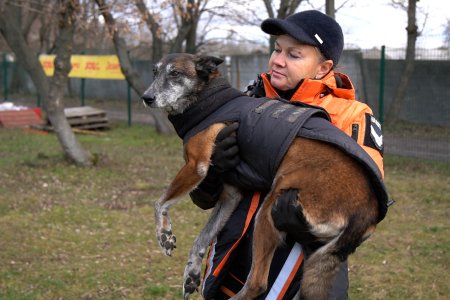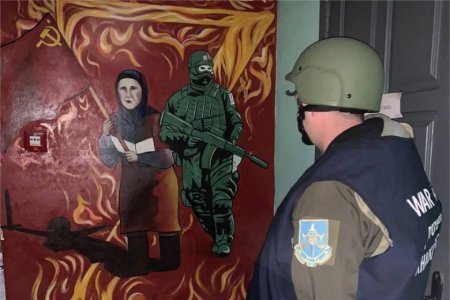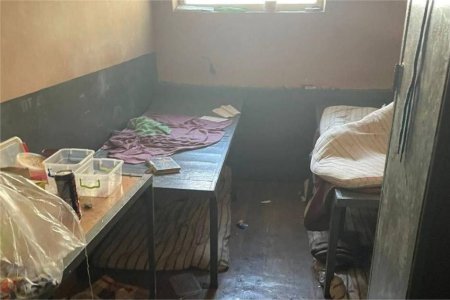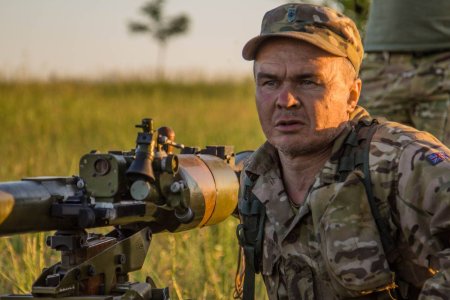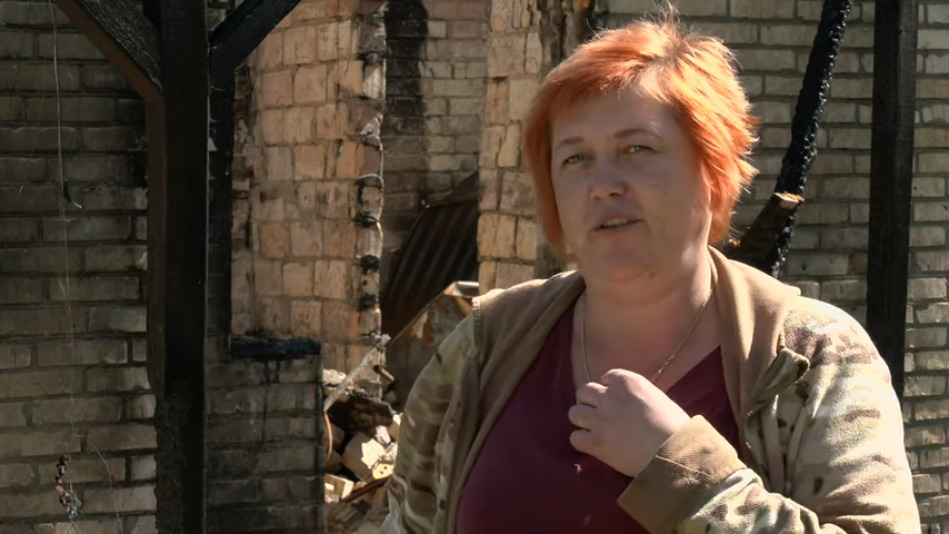
My name is Holovata Svitlana Ivanivna. I live in the village of Moshchun, on Lisna Street. Before the war, I worked at the Fora store. Now, of course, no one is working. Our store has been destroyed, and we are all staying at home.
Could you have imagined that there would be a war?
No, I could not! I collected documents, just in case, so everything was in one package. Nobody packed anything else because we simply did not believe it. On 24 February, we calmly went to work. However, at three o'clock, they told us to close the store. My husband picked me up, and the next day I went to work again. I said we needed to feed the people. But Fora was never opened. We barely got out of there because the bombing had already begun. They started bombing the bridge, and after that, we stayed at home.
Tell us about the first day of the war. How did it all happen?
The first day I was at work. My husband called me constantly and told me about the helicopters that flew by. Then we saw that the airfield in Gostomel had been bombed. Planes, helicopters - we've seen it all. We haven't had any air attacks yet. They bombed Gostomel.
Have you thought about fleeing?
No! We thought that somehow it would stop or they retreat. We didn't plan to leave at all. Even later, on 2 March, I didn't want to go. But we have an old grandmother and a son, which was the only reason we went. But at first, I was opposed to leaving.
What made you leave?
I was worried about the grandmother. Also, when heavy bombardments started, I was afraid to get crippled but not killed. What would I do if I were crippled? It was scary.
Where did you hide during the bombings?
We hid in the cellar. Somehow we learned to distinguish which way they flew. If it was from our side, we went down with our grandmother and son. Four of us lived together: my husband and I, his mother, and our son.
Tell me about your house.
Our house had two parts with separate exits. It was about one hundred and twenty square meters. We had two rooms, a corridor, a kitchen, and a bathroom. Our son lived in the second half. He also had two rooms, a kitchen, and a large corridor. We planned to add a second floor for him. The house was probably forty years old. My father-in-law built it with my mother-in-law. Later, we added the second half with a separate entrance for my husband and me. We have been living together for twenty-five years, and we kept remodeling the house during that time. We added a garage and a second kitchen.
When did the first damage happen in your village?
The first destruction was in our neighbor's garden. It hit his house directly, and the fire broke out immediately. Unfortunately, it was not extinguished, although there were firefighters. The shell also hit our house, but, thank God, it did not explode. We were all at home at the time. Grandmother was in bed, and we lay down on the floor. I was preparing dinner and refused to go to the cellar, so everyone stayed. Also, grandmother was sleeping at that moment; she was eighty, and we did not want to lift her, so we decided to remain in the room. By what miracle we were saved, I do not know. If the shell exploded… We were all in the same room.
Where did it hit?
The shell landed under the house, near the gas meter, but did not break the gas pipe. It happened on 27 February. The shell didn't explode, that's all. At first, we were worried because the shell lay on the wires, so we walked by to look. Unfortunately, we had no electricity but were afraid to start the generator. So we connected to the neighbors' generator to at least charge the phone.
Did you sleep at home after that?
Of course! I said that I would not spend the night in the cellar. So we went down there only during the day. Every morning we would get up, go out into our yard, and chat. We did not do much because we didn't know how to engage ourselves. We lived the best we could. I cooked dinner for everyone.
When did you decide to leave, and why?
On 2 March, I went to my sister to pick up my niece's documents: she left papers that she did not use. My sister’s husband ran up to me and said: “We are leaving!” I said: “How is that? We're not going anywhere!” He responded: “No, we are leaving; they told us we had to go.” Thank God we had a car in which we could escape. Fortunately, it had a full tank of fuel.
First, we went to the Poltava region where my father lived. There were five of us. We picked up a neighbor because he was on his own and did not have another opportunity to leave. Later, the five of us lived in the same room for two months.
Honestly, I thought I would be away only a couple of days, no more. I was also worried that the freezer had not completely defrosted. I didn't plan to be away for long. But then, intense hostilities began. On 7 and 8 March, volunteers took out the last people who could not leave and remained in the cellars. We had no connection, and it was impossible to call anyone. We already knew we couldn't go back because the fighting was going on.
When did you find out that your house was destroyed?
The guy who lived with us told me. He said: “Aunt Svitlana, I'm sorry, but your house is no more.” He told us on 10 March. The house was destroyed on 8 March, but he did not want to spoil my holiday [International Women's day]. That's why he didn't say it right away.
When did you decide to return?
We waited until 9 April. We wanted to return much earlier, but we waited. Finally, on 10 April, we drove back. Everyone who returned earlier took pictures and sent us photos of our house. Therefore, we were prepared. The house has been razed to the ground. It seems that there were no rooms and no furniture. Everything burned down. The only thing left was a refrigerator, dishwasher, and boiler.
Everything burned down: the beds, wardrobes, all wooden furniture, and TV. It felt like there was nothing there. The summer kitchen and garage burned down completely.
When we drove back, we hoped that the summer kitchen was intact. It was completely renovated before, so that we could have moved in. Also, there was a shed I used as a barbershop. We thought about making two shared rooms. We plan to do it now if we get assistance. However, it is unrealistic to do it ourselves as we all are out of work. My Fora is not planning to open, and my husband doesn't have a job either, so we have no finances.
Have invaders entered your village?
They probably lived here. I think they were hiding in the basements of the destroyed homes. For some reason, there was no one in our basement. We have everything intact in the cellar: potatoes, preserves. Maybe it happened because there were more houses nearby. People showed us water and food in the basements of destroyed homes further away from us. It is noticeable that someone lived there or was hiding, but they were not our people.
Where do you live now?
Now we live with my sister. She is working abroad. I am in her house in Moshchun nearby. The niece left for Ivano-Frankivsk and stayed there to work, and she rented an apartment there. We are three sisters. Tomorrow another sister will arrive. Her house was also destroyed. Therefore, we will live together. At least we have something, but they have nothing at all.
What are you planning to do next?
Rebuild. First, we will rebuild a summer kitchen with a garage and move in there with my relatives, but I want to live separately eventually, which means we will rebuild.
Has your attitude towards Russians changed?
Very much! First, because of the war. Secondly, I don’t understand whether they zombified people or people don’t understand what is happening to us. They don't understand and don't support us. Third, we have a terrible attitude toward the Russians now. I don't want to see or hear anything related to them!
